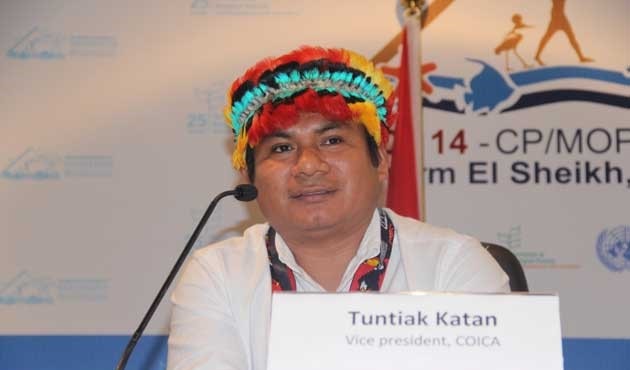The Global Alliance of Territorial Communities, a coalition of organisations representing Indigenous and local communities from Brazil, Indonesia and the nations of the Amazon and Mesoamerica, has called for the recognition of the ancestral and traditional peoples’ lands.

The call was made on Thursday, April 22, 2021 during the Leaders’ Summit on Climate organised by U.S. President Joe Biden.
“It is not a request for charity, nor even for justice: It is our right and also what Western science and the data indicate as the only possible course of action to confront this climate crisis,” said Tuntiak Katan, coordinator of the Global Alliance of Territorial Communities and Indigenous leader of the Shuar people of Ecuador.
Katan was invited to speak at the Summit session on “Nature-Based Solutions,” led by the U.S. Secretary of the Interior, Debra Ann Haaland.
The time for truth has arrived, Katan said, addressing a global audience gathered for the Summit: “Just as our elders traveled to Geneva in 1923 to claim their right to live according to their own laws, on their own lands, and according to their own cosmovision, we come again before all nations, with open hearts, looking ahead to the future together and building a new era, all of us, the protagonists in implementing the solutions that will determine the future of humanity.”
On behalf of the Global Alliance of Territorial Communities, Katan welcomed the Biden Administration’s announcements of funding for climate action and the launch of an initiative on Lowering Emission through Accelerated Forest Finance (LEAF). He also invited governments and international institutions to “learn from past mistakes and avoid depending on the same financing model that has not resulted in the expected outcomes in climate impacts and solutions,” in clear reference to the REDD+ initiative, and its single-minded focus on the capture of carbon.
Katan noted that the findings of a recent study report that Indigenous and other local communities receive less than 1% of climate finance for mitigation and adaptation to climate change.
“That must change, if we really want to avoid climate change,” Katan said. “The forests that are the focus of this Climate Summit are not immense empty spaces.”
“We, Indigenous peoples and local communities, occupy those forests, and we are ready to contribute our forests to one of the most important challenges of our era: the restoration of the Earth,” he said. “However, real restoration can only happen with legal recognition of our rights to our territories. Without this, it will not be possible to ensure the integrity of ecosystems or climate security.”
In the 18 countries that are home to the organisations represented by the Global Alliance of Territorial Communities, Indigenous peoples and local communities occupy more than 840 million hectares of land, the equivalent of 80% of the area of the United States.
“Out of those 840 million hectares, at least 400 million hectares have no recognized legal rights (1),” Katan said. “We need those land rights to be recognised as the first step to ensure the integrity of ecosystems and to live according to our own rights.”
He urged the U.S. president and other heads of state to consider investing in the $5 cost per hectare of titling the forests claimed by Indigenous peoples and local communities in tropical forest countries. Funding this proven climate solution, as calculated by experts at the Rights and Resources Initiative and other research groups, would channel at least $2 billion into securing land rights.
“Numerous scientific studies show the key role of Indigenous peoples and local communities in protecting forests and other key ecosystems,” Katan said. “Where our rights are recognized, there is less deforestation and degradation.”
At a time “full of darkness, it is also time to wake up,” Katan said. “This is a time when Western science and our traditional wisdom are building bridges.”
For this reason, Katan said, the Indigenous leaders of the organizations represented by the Global Alliance disagree with the concept of “Solutions Based on Nature.” Instead, they call on the international community to speak and act with a focus on “Nature and Community-Based Solutions.”
“The communities are already implementing initiatives for the sustainable management of forests,” Katan said. “We are part of the solution to climate change, and that is why recognition of our rights to land is the first step in any serious effort to tackle the climate crisis.”
He ended with the following message: “Mr. Biden, you have the opportunity and the historic responsibility, along with other world leaders, to make the right political decisions to stop the climate crisis.”
